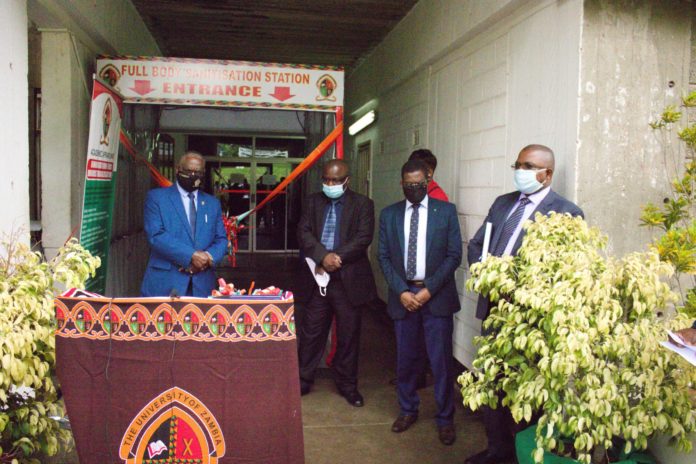The University of Zambia through its Technology Development and Advisory Unit (TDAU) has launched a full body sanitizer to help stop the spread of COVID-19.
Speaking during the launch of the sanitizer, TDAU Project Manager Leonard Simukoko said the unit has launched a number of research prospects, of which the body sanitizer is a notable one.
Our TDAU system has been designed to sanitize both the full human body and the clothes, and it can be reconfigured as an overall ambient system where you sanitize overall indoor systems.
Mr. Simukoko.
Mr. Simukoko explained that the TDAU sanitizer is different from the current full body sanitizers on the market as it sprays fog, rather than liquid disinfectant.
Our TDAU system reduces the amount of disinfectant used by about 30%, and the design can be customised and manufactured to suit client’s needs.
Mr. Simukoko.
The project manager further said the sanitizer runs on a 500 litre drum and can operate for six hours if used continuously. However, with intermittent use it can last for two days.
He elaborated that the sanitizer system has a filter that is connected to a high pressure filter and has a high pressure tubing system, with 32 misting nozzles that are activated by a motion sensor, to ensure that the fogging is not wasted.
The system has been designed for ease of local manufacturing and maintenance. If all materials are available, it can be manufactured by two technicians within two or three days.
Mr. Simukoko.
Meanwhile, University of Zambia Vice Chancellor Professor Luke Mumba has revealed that the project was fully funded by the University of Zambia through its internally generated resources.
The total cost of the manufacture and research that went into the sanitizer was K60,000, and the commercial cost is K45,000 per unit.
Professor Mumba.
Professor Mumba called on the private sector to partner with the university in the production of the sanitizers.
For this project to have impact on society, we need to mass produce this sanitizer. We cannot do that as a university, we need partners to link up with us and support this project.
Professor Mumba.
The Vice Chancellor further explained that the institution’s School of Veterinary Medicine has been instrumental in addressing the COVID-19 pandemic, especially with the onset of the second wave.
You may wish to know that the bio-safety level three laboratory at the School of Veterinary Medicine continues to be a critical center for capacity building and testing in the country, demonstrating a strong and fruitful linkage between UNZA and various wings of government.
Professor Mumba.
Professor Mumba added that the institution has been carrying out works aimed at monitoring the strains we have in the country.
It is important that we monitor through science to see whether those strains are present in our country, this way we can cope with the virus.
Professor Mumba.
Through our work at the School of Veterinary Medicine, it has been possible to inform the ministry of health that we have the 501YV2 strain, which was also found in South Africa.
The Vice Chancellor further assured the university community that management will continue to disinfect university facilities, as a way to adhere to Ministry of Health guidelines.
TDAU is a University of Zambia unit whose intention is to do a knowledge and skills transfer to the local manufacturers through training, and then roll out the production at the unit and through other avenues.
The unit began to prototype and develop the full body sanitizer in May 2020 during the onset of the first wave of the COVID-19 pandemic.

